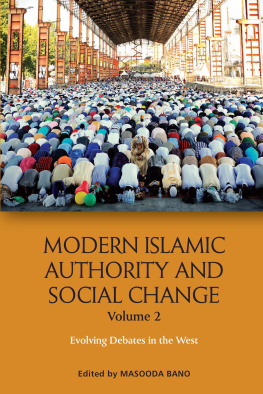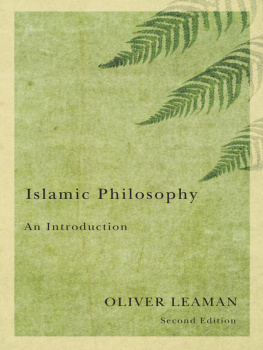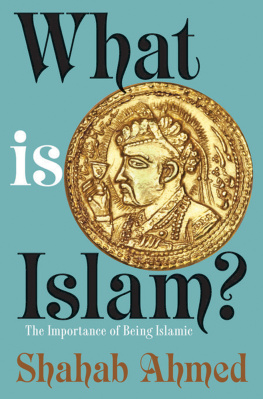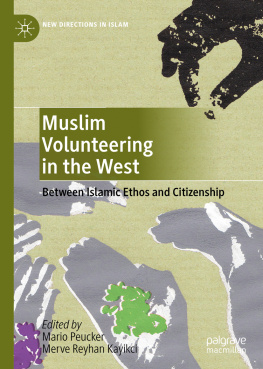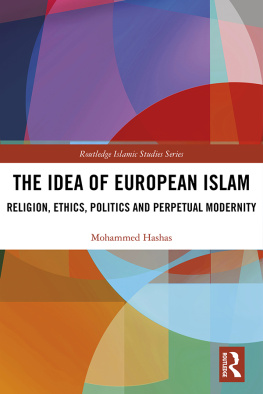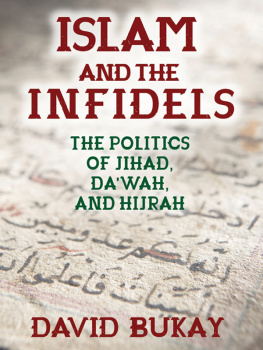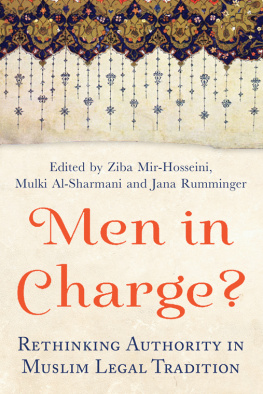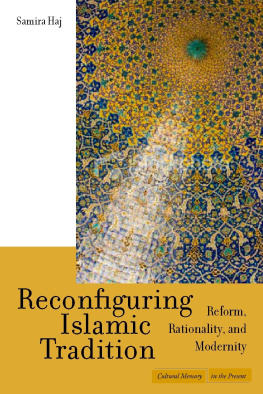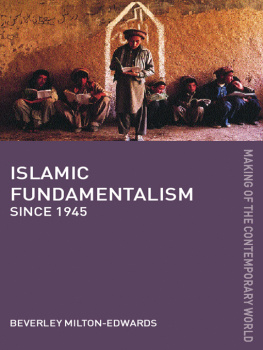
MODERN ISLAMIC
AUTHORITY AND
SOCIAL CHANGE
VOLUME 2
MODERN ISLAMIC
AUTHORITY AND
SOCIAL CHANGE
VOLUME 2
EVOLVING DEBATES
IN THE WEST

EDITED BY MASOODA BANO
EDINBURGH
University Press
Edinburgh University Press is one of the leading university presses in the U.K. We publish academic books and journals in our selected subject areas across the humanities and social sciences, combining cutting-edge scholarship with high editorial and production values to produce academic works of lasting importance. For more information visit our website: edinburghuniversitypress.com
editorial matter and organization Masooda Bano, 2018
the chapters their several authors, 2018
Edinburgh University Press Ltd
The TunHolyrood Road
12 (2f) Jacksons Entry
Edinburgh EH8 8PJ
Typeset in 10/12 Adobe Sabon by
IDSUK (DataConnection) Ltd, and
printed and bound in Great Britain
A CIP record for this book is available from the British Library
ISBN 978 1 4744 3326 6 (hardback)
ISBN 978 1 4744 3328 0 (webready PDF)
ISBN 978 1 4744 3329 7 (epub)
The right of the contributors to be identified as authors of this work has been asserted in accordance with the Copyright, Designs and Patents Act 1988 and the Copyright and Related Rights Regulations 2003 (SI No. 2498).
CONTENTS

Tables
Map
PREFACE
These two volumes are among the first works to be published as part of a five-year project, Changing Structures of Islamic Authority and Consequences for Social Change: A Transnational Review, which I initiated in 2014 with the support of a European Research Council (ERC) Start-up Grant: European Unions Seventh Framework Programme (FP7/2007-2013)/ERC grant agreement no. [337108]. These ERC investigator grants, as they are more commonly known, invest in a compelling research idea by allowing the Principal Investigator the time (five years) and resources (close to 1.5 million Euros) to build a team. These volumes are a product of one such team effort.
Since September 11, 2001, Islamic legal and political thought, as well as the socio-economic and political attitudes of Muslims, have been intensively researched. However, the debate on whether it is the text or the context that drives some Muslims to espouse radical ideals remains unsettled. This project stems from a desire to explicitly address this question and map the plurality of Islamic intellectual thought; to see how scholars from within the dominant Islamic traditions engage with modernity; and, equally importantly, to present some decisive findings on what, if any, is the relationship between the socio-economic and political conditions in which the Muslims in question find themselves and their interpretation of the text. Why is it, after all, that intellectual and rationalist inquiry seemed to have flourished best within Muslim societies when they were politically and economically flourishing, and conservative and inward-looking Islamic movements developed strong roots in many Muslim countries under colonial rule, when Muslims were politically and economically marginalized? Historical analysis suggests that context plays a role in how the text is interpreted. As a social scientist interested in the study of societal conditions and Islamic knowledge transmission, mapping the influence of context in both the creation and transmission of Islamic knowledge remains core to my research. My focus in developing this project was thus two-fold: one, to examine how globally influential Islamic scholarly platforms are engaging with change, with a view to mapping the plurality within the tradition; and, two, to situate each tradition within the socio-economic and political conditions in which it evolved, in order to better understand its historical evolution, and consequently to better predict how its current relationship with the state and society may influence its future trajectory.
The impetus for this project, not surprisingly, came from my earlier research. Since 2006 a combination of research fellowships and research grants have enabled me to carry out fieldwork across a number of Muslim contexts. More specifically, I have maintained two long-term fieldwork sites, in Pakistan and northern Nigeria, and a number of semi-permanent ones, where I return periodically for short periods of fieldwork (Egypt, Syria, and Turkey in the Middle East; Bangladesh and India in South Asia; and Saudi Arabia in the Gulf). The details of most of this fieldwork are available in my earlier publications, and in particular in my recently published monograph, Female Islamic Education Movements: The Re-Democratisation of Islamic Knowledge, which draws on my fieldwork in three of these sites. In addition, I have had opportunities to conduct interviews within Islamic networks in both Malaysia and Indonesia, thereby gaining reasonable exposure to the East Asian Islamic tradition, although I have chosen not to write about it. Further, since 2012, and particularly as part of this project, I have conducted fieldwork with a number of new Islamic scholarly institutions emerging in the West; I have also taken part in many retreats organized by them. The observations that I make in the introduction to Volume 2 thus draw on this ongoing fieldwork with these institutions in the West.
Comparative accounts are challenging to produce, because they require time, an ability to relate to different contexts, and financial resources. They particularly make area specialists nervous. For comparativists like me, however, the excitement of an academic endeavour rests in identifying any common patterns across the peculiarity of each context; we are often driven to identify the core drivers of institutional change and persistence. While I personally find single-author comparative studies most compelling, it is true that a certain kind of comparative work is best done as a team. Studying the plurality of Sunni Islamic scholarly tradition and embedding the evolution of these competing platforms within their specific societal and historical context not only required a very sound knowledge of Islamic textual sources, but equally it required interdisciplinary expertise; in other words, it required building a team.
In the first two years of this project, I was thus very fortunate to have the assistance of two very bright minds to advance this undertaking: Nathan Spannaus used his training in Islamic intellectual history to trace the evolution of each scholarly platform being studied, and map its relationship with the state and society, while Pooya Razavian, a student of Islamic Studies and also trained in traditional Islamic scholarly tradition in Iran, took the lead on analysis of the Islamic legal debates. I, on the other hand, retained a focus on mapping the contemporary political economy of these institutions. We were also fortunate to have support of Emre Caliskan, a doctoral candidate at Oxford, who brought knowledge of Turkish language to the team. It is this convergence of expertise that is, to me, the core strength of these two volumes; thus Volume 1 not only offers a rare comparison of current debates within the four most influential Sunni Islamic scholarly platforms today; it also presents a more comprehensive analysis of the evolution of each than is normally available in existing publications.
Volume 2 is organized differently from Volume 1; yet it is important to note that the analytical approach and core driving questions are the same. The different organizational structure is actually reflective of the very recent history of the Islamic institutions in the West. Volume 2 focuses on the new institutions emerging in the West that have started to rival the authority of the four institutions covered in Volume 1. Being relatively new, these institutions did not lend themselves to the three-chapter analytical format adopted in Volume 1: in terms of their origin, there were not centuries of history to cover; further, because of being based in the U.K. or the U.S.A., their socio-political context was also less varied than that of the institutions covered in Volume 1. Thus, in Volume 2 I could provide the contextual information on the evolution of all the institutions covered within the introduction, as opposed to dedicating individual chapters to each.
Next page
